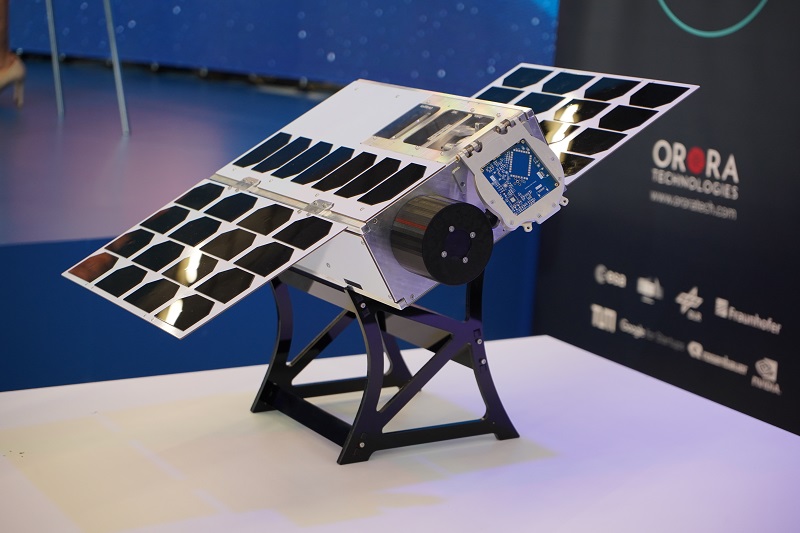The country’s capabilities in dealing with natural disasters through Space Technologies are strengthened
As part of the “National Microsatellite Program”, Greece is acquiring a total of six Thermal and Radar (SAR) Microsatellites, which will enhance the country’s ability to deal with natural disasters through advanced space technologies.
This is an important Program, which is financed by the National Recovery and Resilience Plan “Greece 2.0”, and is implemented in collaboration with the European Space Agency (ESA). With the specific investments, with a total budget of 53 million euros, Greece becomes stronger and more autonomous in the field of space technology and applications related to civil protection and crisis response. The relevant agreements for the construction and launch of the Microsatellite cluster were signed today, September 09, between the European Space Agency (ESA) and the OroraTech and ICEYE companies at Stand 12 of the Ministry of Digital Governance at the 88th TIF, in the presence of the Minister of Digital Governance, Dimitris Papastergiou, the Deputy Minister, Konstantinos Kyranakis and the General Secretary of Telecommunications and Posts, Konstantinos Karantzalos.
These are two projects of strategic importance for Greece. The data collected by the microsatellites will enhance the authorities’ ability to monitor the marine and terrestrial environment, detect changes, identify and map natural disasters such as fires and floods, thus protecting human lives, nature and the property. The microsatellites, which will be deployed through these contracts, will provide real-time vital data, enabling the relevant authorities to make more targeted and effective decisions to strengthen the country’s resilience in the face of the climate crisis.
The contracts were signed by the European Space Agency’s Head of Earth Observation Projects, Dominique Gilliéron, OroraTech CEO Martin Langer and ICEYE CEO Rafal Modrzewski, while the ceremony was attended by members of its Management and Scientific Staff Hellenic Space Center.
The Minister of Digital Governance, Dimitris Papastergiou stated: “By signing these contracts, we are taking another step towards shielding the country against natural disasters, utilizing the most modern technologies. With resources from the Recovery Fund we are investing in space and acquiring valuable tools that will provide us with real-time data. Microsatellites will provide us with immediate and accurate information at critical moments. Recent experiences, unfortunately gained in natural disasters, highlight the criticality of having accurate data for timely and valid decision-making. It is extremely hopeful that Greece is getting its own “space” in space and its own data, which all agencies will be able to use to formulate policies in critical areas such as civil protection and tackling climate change” .
The Deputy Minister of Digital Governance, Konstantinos Kyranakis said: “Our goal at the Ministry is to find practical solutions and applications that can improve the country’s operational capabilities. Today, by signing these space-related contracts, we are increasing Greece’s operational capabilities on Earth. Now we can map, observe, organize based on the “eyes” we will have up there in space, thus providing the Fire Department and Civil Protection with the appropriate data to deal with natural disasters.”
The General Secretary of Telecommunications and Posts, Konstantinos Karantzalos, underlined: “With today’s programs for the development of Thermal and Radar Microsatellites, we are implementing a very important part of the Greek Space Program. We are improving our ability to monitor the marine and land environment night and day, while strengthening our country’s role in the European and international space technology arena. Infrastructure is being created, know-how is being developed, our scientists and engineers are being trained and working on cutting-edge technologies. Important steps that gradually contribute to the autonomy of our country in the development of integrated space systems and satellites”.
OroraTech CEO & CTO Martin Langer said: “For us at OroraTech, this contract is more than just a formality – it’s a commitment to equip Greece with advanced technology to detect, respond and control forest fires . Forest fires are becoming more and more destructive, but our solution aims to provide firefighters and civil protection planners with game-changing tools to reduce the consequences of these phenomena. This represents our commitment to change the future of forest fire management in the Hellenic Republic”
CEO and Co-Founder of ICEYE, Rafal Modrzewski noted: “ICEYE is proud to contribute to the development of the Greek Government’s space program and to the strengthening of the Greek space sector. ICEYE’s SAR satellites and their data will enable Greece to monitor areas of interest and improve its national observing capability for security and protection, including flood monitoring and maritime surveillance. We look forward to working with the Greek space industry and helping to accelerate its development.”








